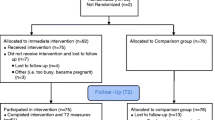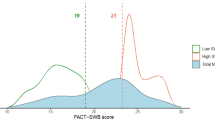Abstract
We examined the effects of a10-week, group-based cognitive-behavioral stressman-agement (CBSM) intervention on serum testosterone levels in women with Stage 1or 2 breast cancer. At 4 to 8 weeks postsurgery, participants were randomized to CBSM (n = 24) or to a wait-list control group (n = 10). Free and total testosterone was assessed via radioimmunoassay before and after the study period. The participants also completed a questionnaire assessing the degree to which living with breast cancer had led to social and emotional benefits in their life. We observed significant decreases in testosterone levels in the CBSM group and no change in the controls. Decreasesintes-tosterone were related to increases in positive contributions. These findings suggest that a short-term psychological intervention can help modulate androgen functioning, and these changes are related to enhanced benefit finding observed among women with breast cancer participating in CBSM.
Similar content being viewed by others
References
Andersen, B. L. (1992). Psychological interventions for cancer patients to enhance the quality of life. Journal of Consulting and Clinical Psychology, 60, 552–568.
Antoni, M. H., Lehman, J., Kilbourn, K., Boyers, A., Yount, S., Culver, J., Alferi, S., McGregor, B., Arena, P., Harris, S., Price, A., & Carver, C. S. (in press). Cognitive-behavioral stress management intervention decreases the prevalence of depression and enhances benefit-finding among women under treatment for early stage breast cancer. Health Psychology, 20, 20–32.
Beck, A. T., Emery, G., & Greenberg, H. (1985). Anxiety disorders and phobias: A cognitive perspective. New York: Basic Books.
Benson, H., & Klipper, M. (1976). The relaxation response. New York: Avon.
Bernstein, D., & Borkovec, T. (1973). Progressive relaxation training:Amanual for the helping professions. Champaign, IL: Research Press.
Berrino, F., Muti, P., Micheli, A., Bolelli, G., Krogh, V., Sciajno, R., Pisani, P., Panico, S., & Secreto, G. (1996). Serum sex hormone levels after menopause and subsequent breast cancer. Journal of the National Cancer Institute, 88, 291–296.
Carver, C. S., Pozo, C., Harris, S.D., & Noriega, V. (1993). How coping mediates the effect of optimism on distress: A study of women with early stage breast cancer. Journal of Personality and Social Psychology, 65, 375–390.
Carver, C. S., Pozo-Kaderman, C., Price, A. A., Noriega, V., Harris, S. D., Derhagopian, R. P., Robinson, D. S., & Moffatt, F. L. (1998). Concern about aspects of body image and adjustment to early stage breast cancer. Psychosomatic Medicine, 60, 168–174.
Cauley, J. A., Lucas, F. L., Kuller, L. H., Stone, K., Browner, W., & Cummings, S. R. (1999). Elevated serum estradiol and testosterone concentrations are associated with high risk for breast cancer. Study of Osteoporotic Fractures Research Group. Annals of Internal Medicine, 130, 270–277.
Cruess, D. G., Antoni, M. H., McGregor, B. A., Kilbourn, K. M., Boyers, A. E., Alferi, S. M., Carver, C. S., & Kumar, M. (2000). Cognitive-behavioral stress management reduces serum cortisol by enhancing benefit finding among women being treated for early-stage breast cancer. Psychosomatic Medicine, 62, 304–308.
Davis, M. D., Eshelman, E. R., & McKay, M. (1988). The relaxation and stress reduction workbook (3rd ed.). Oakland, CA: New Harbinger.
Dorgan, J. F., Longcope, C., Stephenson, H. E., Falk, R. T., Miller, R., Franz, C., Kahle, L., Campbell, W. S., Tangrea, J. A., & Schatzkin, A. (1997). Serum sex hormone levels are related to breast cancer risk in postmenopausal women. Environmental Health Perspectives, 105, 583–585.
Fensterheim, H., & Baer, J. (1975). Don’t say yes when you want to say no. New York: David McKay.
Folkman, S., Chesney, M., McKusick, L., Ironson, G., Johnson, D., & Coates. T. J. (1991). Translating coping theory into intervention. In J. Eckenrode (Ed.), The social context of stress (pp. 239–260). New York: Plenum.
Jacobsen, P. B., Bovbjerg, D. H., Scwartz, M. D., & Hudis, C. A. (1995). Conditioned emotional distress in women receiving chemotherapy for breast cancer. Journal of Consulting and Clinical Psychology, 63, 108–114.
Kaplan, H. S. (1994). A neglected issue: The sexual side-effects of current treatments for breast cancer. Canadian Journal of Human Sexuality, 3, 151–163.
McTiernan, A., Ulrich, C., Kumai, C., Bean, D., Schwartz, R., Mahloch, J., Hastings, R., Gralow, J., & Potter, J. D. (1998). Anthropomorphic and hormone effects of aneight-week exercise-dietintervention in breast cancer patients: Results of a pilot study. Cancer Epidemiology Biomarkers and Prevention, 7, 477–481.
Schag, C. A., Ganz, P. A., Polinsky, M. L., Fred, C., Hirji, K., & Petersen, L. (1993). Characteristics of women at risk for psychosocial distress in the year after breast cancer. Journal of Clinical Oncology, 11, 783–793.
Schedlowski, M., Jung, C., Schimanski, G., Tewes, U., & Schmoll, H. J. (1994). Effects of behavioral intervention on plasma cortisol and lymphocytes in breast cancer patients: An exploratory study. Psycho-oncology, 3, 181–187.
Secreto, G., Recchione, C., Cavalleri, A., Miraglia, M., & Dati, V. (1983). Circulating levels of testosterone, 17 beta-oestradiol, luteinising hormone and prolactin in postmenopausal breast cancer patients. British Journal of Cancer, 47, 269–275.
Secreto, G., & Zumoff, B. (1994). Abnormal production of androgens in women with breast cancer. Anticancer Research, 14, 2113–2117.
Spiegel, D., Bloom, J. R., Kraemer, H. C., & Gottheil, E. (1989). Effect of psychosocial treatment on survival of patients with metastatic breast cancer. Lancet, 2, 888–891.
Spiegel, D., Bloom, J. R., & Yalom, I. (1981). Group support for patients with metastatic cancer: A randomized outcome study. Archives of General Psychiatry, 38, 527–533.
Stanton, A. L., Danoff-Burg, S., Cameron, C. L., Cameron, C. L., Snider, P. R., & Kirk, S. B. (1999). Social comparison and adjustment to breast cancer: An experimental examination of upward affiliation and downward evaluation. Health Psychology, 18, 151–158.
Stanton, A. L., & Snider, P. R. (1993). Coping with a breast cancer diagnosis: A prospective study. Health Psychology, 12, 16–23.
Takitani, O., Kosano, H., Okumoto, T., Akamatsu, K., Tamakuma, S., & Hiraide, H. (1987). Distribution of estradiol and percentage of free testosterone in sera of Japanese women: Preoperative breast cancer patients and normal controls. Journal of the National Cancer Institute, 79, 1199–1204.
Tedesci, R. G., & Calhoun, L. G. (1995). Trauma and transformation: Growing in the aftermath of suffering. Thousand Oaks, CA: Sage.
van der Pompe, G., Duivenvoorden, H. J., Antoni, M. H., Visser, A., & Heijnen, C. J. (1997). Effectiveness of a short-term group psychotherapy program on endocrine and immune function in breast cancer patients: An exploratory study. Journal of Psychosomatic Research, 42, 453–466.
Yalow, R., & Berson, S. (1971). Introduction and general considerations. In W. D. Odell & W. H. Daughday (Eds.), Principles of competitive protein binding assays (pp. 1–19). Philadelphia: Lippincott.
Zeleniuch-Jacquotte, A., Bruning, P. F., Bonfrer, J. M., Koenig, K. L., Shore, R. E., Kim, M. Y., Pasternac, B. S., & Toniolo, P. (1997). Relation of serum levels of testosterone and dehydroepiandrosterone sulfate to risk of breast cancer in postmenopausal women. American Journal of Epidemiology, 145, 1030–1038.
Zumoff, B. (1994). Hormonal profiles in women with breast cancer. Obstetric and Gynecological Clinics of North America, 21, 751–772.
Author information
Authors and Affiliations
Rights and permissions
About this article
Cite this article
Cruess, D.G., Antoni, M.H., Kumar, M. et al. Effects of stress management on testosterone levels in women with early-stage breast cancer. Int. J. Behav. Med. 8, 194–207 (2001). https://doi.org/10.1207/S15327558IJBM0803_2
Issue Date:
DOI: https://doi.org/10.1207/S15327558IJBM0803_2




